BSc BMP3003 Business Management: Academic Integrity & Game Reflection
VerifiedAdded on 2023/06/18
|9
|2565
|246
Report
AI Summary
This report provides an overview of academic integrity, discussing its importance in higher education and the implications of academic misconduct. It reflects on the steps taken and difficulties encountered in producing a game for Assignment 2, which aimed to promote academic integrity among students. The report also reflects on the skills learned during the academic year, particularly those emphasized during the game's production, such as creative skills, presentational abilities, and technical talents. The game, designed as a Plagiarism Captcha, aimed to test students' knowledge and motivate them to develop a sense of academic integrity. Difficulties included choosing a suitable game, formulating relevant questions, and organizing the game's structure. The report concludes by highlighting the value of academic integrity in fostering trust, enhancing the value of degrees, and preventing penalties for academic misconduct.
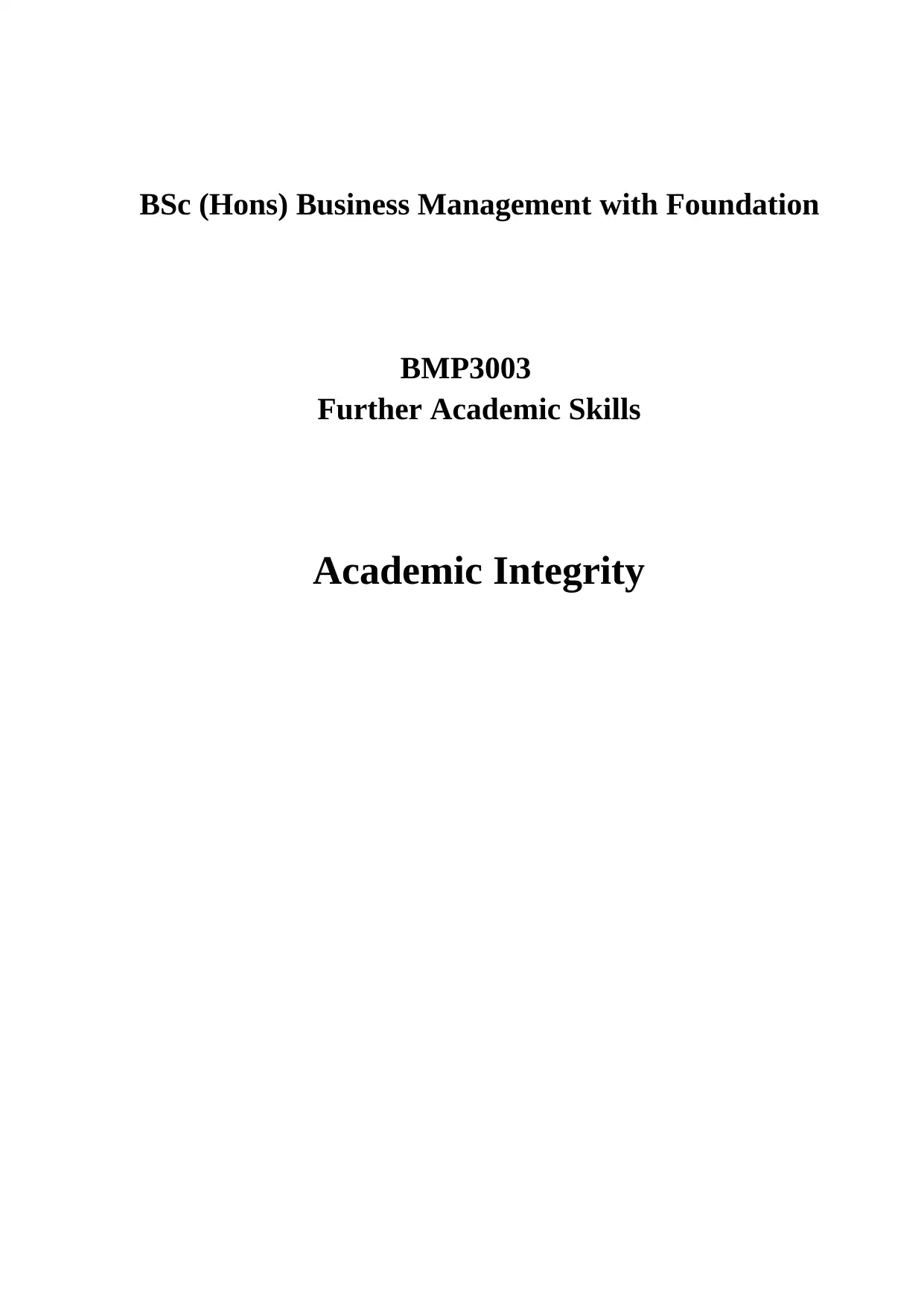
BSc (Hons) Business Management with Foundation
BMP3003
Further Academic Skills
Academic Integrity
BMP3003
Further Academic Skills
Academic Integrity
Paraphrase This Document
Need a fresh take? Get an instant paraphrase of this document with our AI Paraphraser
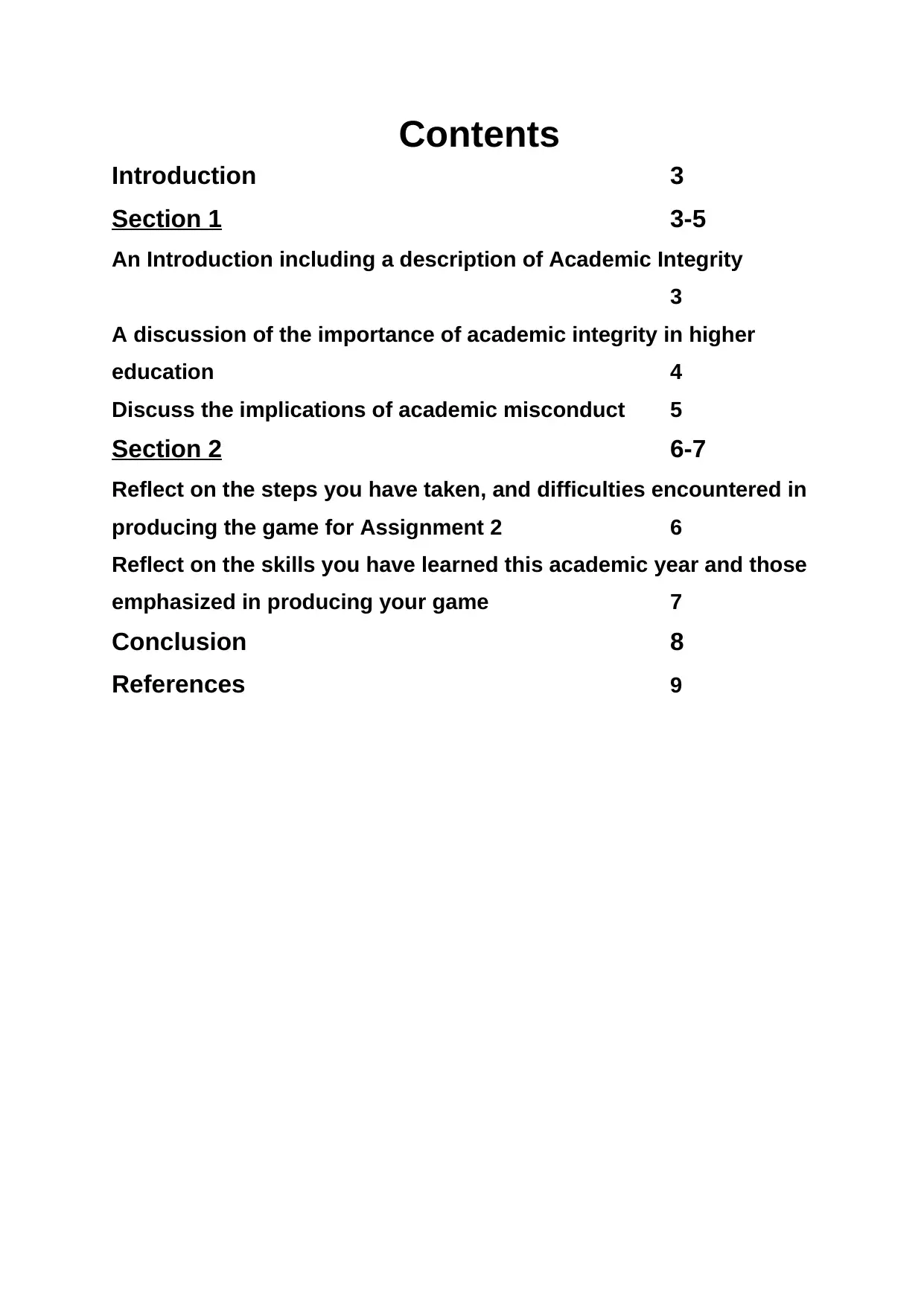
Contents
Introduction 3
Section 1 3-5
An Introduction including a description of Academic Integrity
3
A discussion of the importance of academic integrity in higher
education 4
Discuss the implications of academic misconduct 5
Section 2 6-7
Reflect on the steps you have taken, and difficulties encountered in
producing the game for Assignment 2 6
Reflect on the skills you have learned this academic year and those
emphasized in producing your game 7
Conclusion 8
References 9
Introduction 3
Section 1 3-5
An Introduction including a description of Academic Integrity
3
A discussion of the importance of academic integrity in higher
education 4
Discuss the implications of academic misconduct 5
Section 2 6-7
Reflect on the steps you have taken, and difficulties encountered in
producing the game for Assignment 2 6
Reflect on the skills you have learned this academic year and those
emphasized in producing your game 7
Conclusion 8
References 9
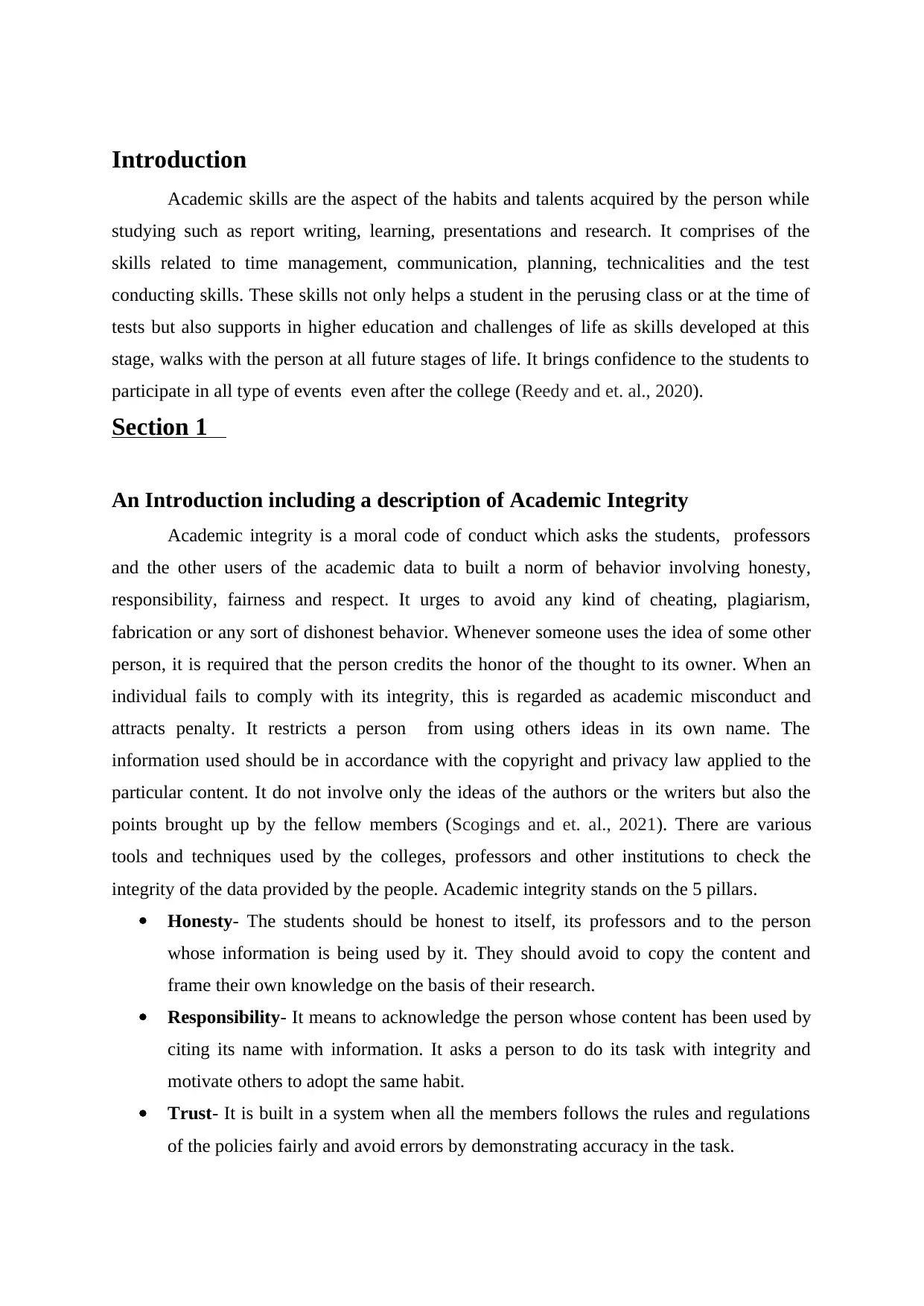
Introduction
Academic skills are the aspect of the habits and talents acquired by the person while
studying such as report writing, learning, presentations and research. It comprises of the
skills related to time management, communication, planning, technicalities and the test
conducting skills. These skills not only helps a student in the perusing class or at the time of
tests but also supports in higher education and challenges of life as skills developed at this
stage, walks with the person at all future stages of life. It brings confidence to the students to
participate in all type of events even after the college (Reedy and et. al., 2020).
Section 1
An Introduction including a description of Academic Integrity
Academic integrity is a moral code of conduct which asks the students, professors
and the other users of the academic data to built a norm of behavior involving honesty,
responsibility, fairness and respect. It urges to avoid any kind of cheating, plagiarism,
fabrication or any sort of dishonest behavior. Whenever someone uses the idea of some other
person, it is required that the person credits the honor of the thought to its owner. When an
individual fails to comply with its integrity, this is regarded as academic misconduct and
attracts penalty. It restricts a person from using others ideas in its own name. The
information used should be in accordance with the copyright and privacy law applied to the
particular content. It do not involve only the ideas of the authors or the writers but also the
points brought up by the fellow members (Scogings and et. al., 2021). There are various
tools and techniques used by the colleges, professors and other institutions to check the
integrity of the data provided by the people. Academic integrity stands on the 5 pillars.
Honesty- The students should be honest to itself, its professors and to the person
whose information is being used by it. They should avoid to copy the content and
frame their own knowledge on the basis of their research.
Responsibility- It means to acknowledge the person whose content has been used by
citing its name with information. It asks a person to do its task with integrity and
motivate others to adopt the same habit.
Trust- It is built in a system when all the members follows the rules and regulations
of the policies fairly and avoid errors by demonstrating accuracy in the task.
Academic skills are the aspect of the habits and talents acquired by the person while
studying such as report writing, learning, presentations and research. It comprises of the
skills related to time management, communication, planning, technicalities and the test
conducting skills. These skills not only helps a student in the perusing class or at the time of
tests but also supports in higher education and challenges of life as skills developed at this
stage, walks with the person at all future stages of life. It brings confidence to the students to
participate in all type of events even after the college (Reedy and et. al., 2020).
Section 1
An Introduction including a description of Academic Integrity
Academic integrity is a moral code of conduct which asks the students, professors
and the other users of the academic data to built a norm of behavior involving honesty,
responsibility, fairness and respect. It urges to avoid any kind of cheating, plagiarism,
fabrication or any sort of dishonest behavior. Whenever someone uses the idea of some other
person, it is required that the person credits the honor of the thought to its owner. When an
individual fails to comply with its integrity, this is regarded as academic misconduct and
attracts penalty. It restricts a person from using others ideas in its own name. The
information used should be in accordance with the copyright and privacy law applied to the
particular content. It do not involve only the ideas of the authors or the writers but also the
points brought up by the fellow members (Scogings and et. al., 2021). There are various
tools and techniques used by the colleges, professors and other institutions to check the
integrity of the data provided by the people. Academic integrity stands on the 5 pillars.
Honesty- The students should be honest to itself, its professors and to the person
whose information is being used by it. They should avoid to copy the content and
frame their own knowledge on the basis of their research.
Responsibility- It means to acknowledge the person whose content has been used by
citing its name with information. It asks a person to do its task with integrity and
motivate others to adopt the same habit.
Trust- It is built in a system when all the members follows the rules and regulations
of the policies fairly and avoid errors by demonstrating accuracy in the task.
⊘ This is a preview!⊘
Do you want full access?
Subscribe today to unlock all pages.

Trusted by 1+ million students worldwide
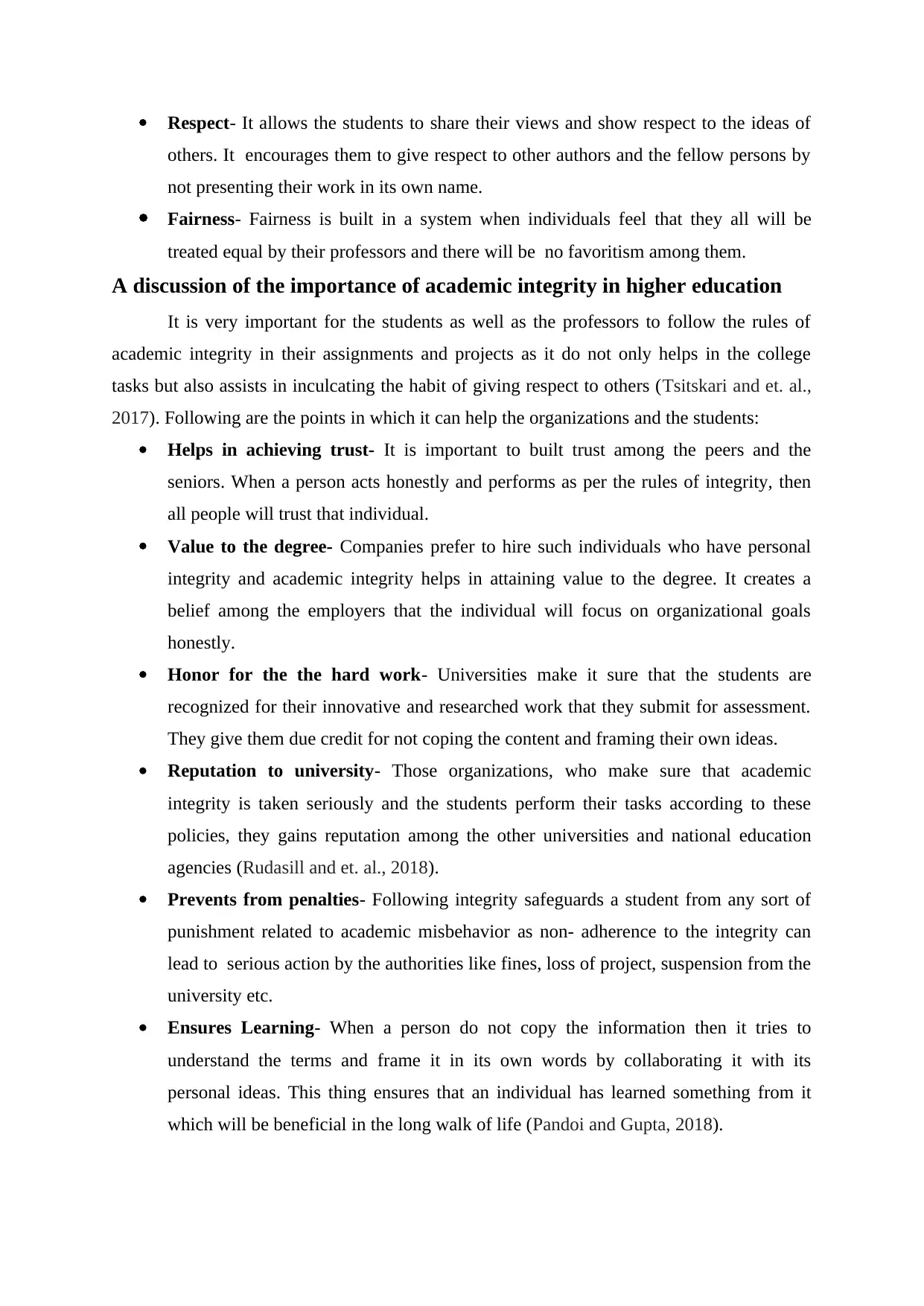
Respect- It allows the students to share their views and show respect to the ideas of
others. It encourages them to give respect to other authors and the fellow persons by
not presenting their work in its own name.
Fairness- Fairness is built in a system when individuals feel that they all will be
treated equal by their professors and there will be no favoritism among them.
A discussion of the importance of academic integrity in higher education
It is very important for the students as well as the professors to follow the rules of
academic integrity in their assignments and projects as it do not only helps in the college
tasks but also assists in inculcating the habit of giving respect to others (Tsitskari and et. al.,
2017). Following are the points in which it can help the organizations and the students:
Helps in achieving trust- It is important to built trust among the peers and the
seniors. When a person acts honestly and performs as per the rules of integrity, then
all people will trust that individual.
Value to the degree- Companies prefer to hire such individuals who have personal
integrity and academic integrity helps in attaining value to the degree. It creates a
belief among the employers that the individual will focus on organizational goals
honestly.
Honor for the the hard work- Universities make it sure that the students are
recognized for their innovative and researched work that they submit for assessment.
They give them due credit for not coping the content and framing their own ideas.
Reputation to university- Those organizations, who make sure that academic
integrity is taken seriously and the students perform their tasks according to these
policies, they gains reputation among the other universities and national education
agencies (Rudasill and et. al., 2018).
Prevents from penalties- Following integrity safeguards a student from any sort of
punishment related to academic misbehavior as non- adherence to the integrity can
lead to serious action by the authorities like fines, loss of project, suspension from the
university etc.
Ensures Learning- When a person do not copy the information then it tries to
understand the terms and frame it in its own words by collaborating it with its
personal ideas. This thing ensures that an individual has learned something from it
which will be beneficial in the long walk of life (Pandoi and Gupta, 2018).
others. It encourages them to give respect to other authors and the fellow persons by
not presenting their work in its own name.
Fairness- Fairness is built in a system when individuals feel that they all will be
treated equal by their professors and there will be no favoritism among them.
A discussion of the importance of academic integrity in higher education
It is very important for the students as well as the professors to follow the rules of
academic integrity in their assignments and projects as it do not only helps in the college
tasks but also assists in inculcating the habit of giving respect to others (Tsitskari and et. al.,
2017). Following are the points in which it can help the organizations and the students:
Helps in achieving trust- It is important to built trust among the peers and the
seniors. When a person acts honestly and performs as per the rules of integrity, then
all people will trust that individual.
Value to the degree- Companies prefer to hire such individuals who have personal
integrity and academic integrity helps in attaining value to the degree. It creates a
belief among the employers that the individual will focus on organizational goals
honestly.
Honor for the the hard work- Universities make it sure that the students are
recognized for their innovative and researched work that they submit for assessment.
They give them due credit for not coping the content and framing their own ideas.
Reputation to university- Those organizations, who make sure that academic
integrity is taken seriously and the students perform their tasks according to these
policies, they gains reputation among the other universities and national education
agencies (Rudasill and et. al., 2018).
Prevents from penalties- Following integrity safeguards a student from any sort of
punishment related to academic misbehavior as non- adherence to the integrity can
lead to serious action by the authorities like fines, loss of project, suspension from the
university etc.
Ensures Learning- When a person do not copy the information then it tries to
understand the terms and frame it in its own words by collaborating it with its
personal ideas. This thing ensures that an individual has learned something from it
which will be beneficial in the long walk of life (Pandoi and Gupta, 2018).
Paraphrase This Document
Need a fresh take? Get an instant paraphrase of this document with our AI Paraphraser
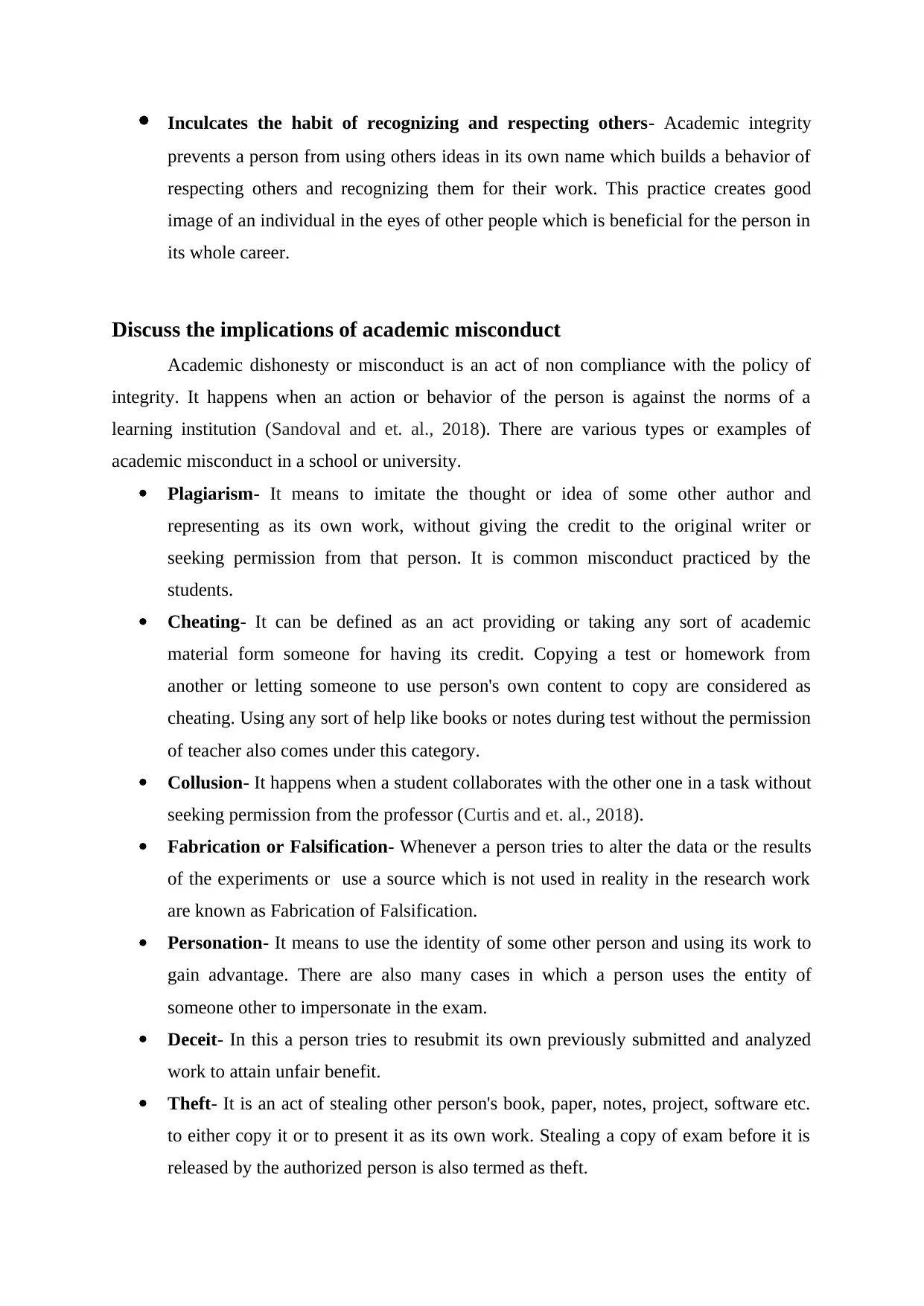
Inculcates the habit of recognizing and respecting others- Academic integrity
prevents a person from using others ideas in its own name which builds a behavior of
respecting others and recognizing them for their work. This practice creates good
image of an individual in the eyes of other people which is beneficial for the person in
its whole career.
Discuss the implications of academic misconduct
Academic dishonesty or misconduct is an act of non compliance with the policy of
integrity. It happens when an action or behavior of the person is against the norms of a
learning institution (Sandoval and et. al., 2018). There are various types or examples of
academic misconduct in a school or university.
Plagiarism- It means to imitate the thought or idea of some other author and
representing as its own work, without giving the credit to the original writer or
seeking permission from that person. It is common misconduct practiced by the
students.
Cheating- It can be defined as an act providing or taking any sort of academic
material form someone for having its credit. Copying a test or homework from
another or letting someone to use person's own content to copy are considered as
cheating. Using any sort of help like books or notes during test without the permission
of teacher also comes under this category.
Collusion- It happens when a student collaborates with the other one in a task without
seeking permission from the professor (Curtis and et. al., 2018).
Fabrication or Falsification- Whenever a person tries to alter the data or the results
of the experiments or use a source which is not used in reality in the research work
are known as Fabrication of Falsification.
Personation- It means to use the identity of some other person and using its work to
gain advantage. There are also many cases in which a person uses the entity of
someone other to impersonate in the exam.
Deceit- In this a person tries to resubmit its own previously submitted and analyzed
work to attain unfair benefit.
Theft- It is an act of stealing other person's book, paper, notes, project, software etc.
to either copy it or to present it as its own work. Stealing a copy of exam before it is
released by the authorized person is also termed as theft.
prevents a person from using others ideas in its own name which builds a behavior of
respecting others and recognizing them for their work. This practice creates good
image of an individual in the eyes of other people which is beneficial for the person in
its whole career.
Discuss the implications of academic misconduct
Academic dishonesty or misconduct is an act of non compliance with the policy of
integrity. It happens when an action or behavior of the person is against the norms of a
learning institution (Sandoval and et. al., 2018). There are various types or examples of
academic misconduct in a school or university.
Plagiarism- It means to imitate the thought or idea of some other author and
representing as its own work, without giving the credit to the original writer or
seeking permission from that person. It is common misconduct practiced by the
students.
Cheating- It can be defined as an act providing or taking any sort of academic
material form someone for having its credit. Copying a test or homework from
another or letting someone to use person's own content to copy are considered as
cheating. Using any sort of help like books or notes during test without the permission
of teacher also comes under this category.
Collusion- It happens when a student collaborates with the other one in a task without
seeking permission from the professor (Curtis and et. al., 2018).
Fabrication or Falsification- Whenever a person tries to alter the data or the results
of the experiments or use a source which is not used in reality in the research work
are known as Fabrication of Falsification.
Personation- It means to use the identity of some other person and using its work to
gain advantage. There are also many cases in which a person uses the entity of
someone other to impersonate in the exam.
Deceit- In this a person tries to resubmit its own previously submitted and analyzed
work to attain unfair benefit.
Theft- It is an act of stealing other person's book, paper, notes, project, software etc.
to either copy it or to present it as its own work. Stealing a copy of exam before it is
released by the authorized person is also termed as theft.
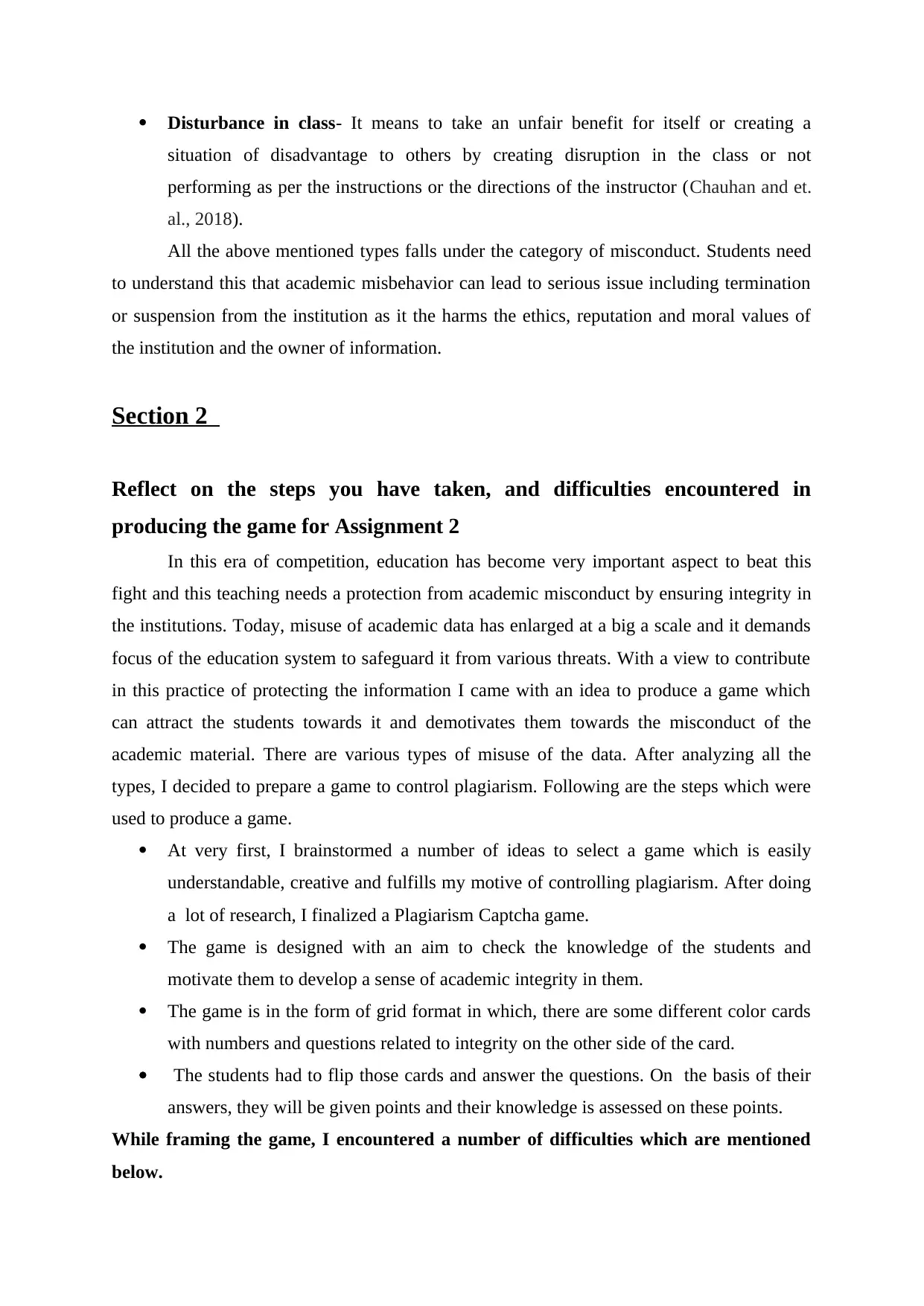
Disturbance in class- It means to take an unfair benefit for itself or creating a
situation of disadvantage to others by creating disruption in the class or not
performing as per the instructions or the directions of the instructor (Chauhan and et.
al., 2018).
All the above mentioned types falls under the category of misconduct. Students need
to understand this that academic misbehavior can lead to serious issue including termination
or suspension from the institution as it the harms the ethics, reputation and moral values of
the institution and the owner of information.
Section 2
Reflect on the steps you have taken, and difficulties encountered in
producing the game for Assignment 2
In this era of competition, education has become very important aspect to beat this
fight and this teaching needs a protection from academic misconduct by ensuring integrity in
the institutions. Today, misuse of academic data has enlarged at a big a scale and it demands
focus of the education system to safeguard it from various threats. With a view to contribute
in this practice of protecting the information I came with an idea to produce a game which
can attract the students towards it and demotivates them towards the misconduct of the
academic material. There are various types of misuse of the data. After analyzing all the
types, I decided to prepare a game to control plagiarism. Following are the steps which were
used to produce a game.
At very first, I brainstormed a number of ideas to select a game which is easily
understandable, creative and fulfills my motive of controlling plagiarism. After doing
a lot of research, I finalized a Plagiarism Captcha game.
The game is designed with an aim to check the knowledge of the students and
motivate them to develop a sense of academic integrity in them.
The game is in the form of grid format in which, there are some different color cards
with numbers and questions related to integrity on the other side of the card.
The students had to flip those cards and answer the questions. On the basis of their
answers, they will be given points and their knowledge is assessed on these points.
While framing the game, I encountered a number of difficulties which are mentioned
below.
situation of disadvantage to others by creating disruption in the class or not
performing as per the instructions or the directions of the instructor (Chauhan and et.
al., 2018).
All the above mentioned types falls under the category of misconduct. Students need
to understand this that academic misbehavior can lead to serious issue including termination
or suspension from the institution as it the harms the ethics, reputation and moral values of
the institution and the owner of information.
Section 2
Reflect on the steps you have taken, and difficulties encountered in
producing the game for Assignment 2
In this era of competition, education has become very important aspect to beat this
fight and this teaching needs a protection from academic misconduct by ensuring integrity in
the institutions. Today, misuse of academic data has enlarged at a big a scale and it demands
focus of the education system to safeguard it from various threats. With a view to contribute
in this practice of protecting the information I came with an idea to produce a game which
can attract the students towards it and demotivates them towards the misconduct of the
academic material. There are various types of misuse of the data. After analyzing all the
types, I decided to prepare a game to control plagiarism. Following are the steps which were
used to produce a game.
At very first, I brainstormed a number of ideas to select a game which is easily
understandable, creative and fulfills my motive of controlling plagiarism. After doing
a lot of research, I finalized a Plagiarism Captcha game.
The game is designed with an aim to check the knowledge of the students and
motivate them to develop a sense of academic integrity in them.
The game is in the form of grid format in which, there are some different color cards
with numbers and questions related to integrity on the other side of the card.
The students had to flip those cards and answer the questions. On the basis of their
answers, they will be given points and their knowledge is assessed on these points.
While framing the game, I encountered a number of difficulties which are mentioned
below.
⊘ This is a preview!⊘
Do you want full access?
Subscribe today to unlock all pages.

Trusted by 1+ million students worldwide
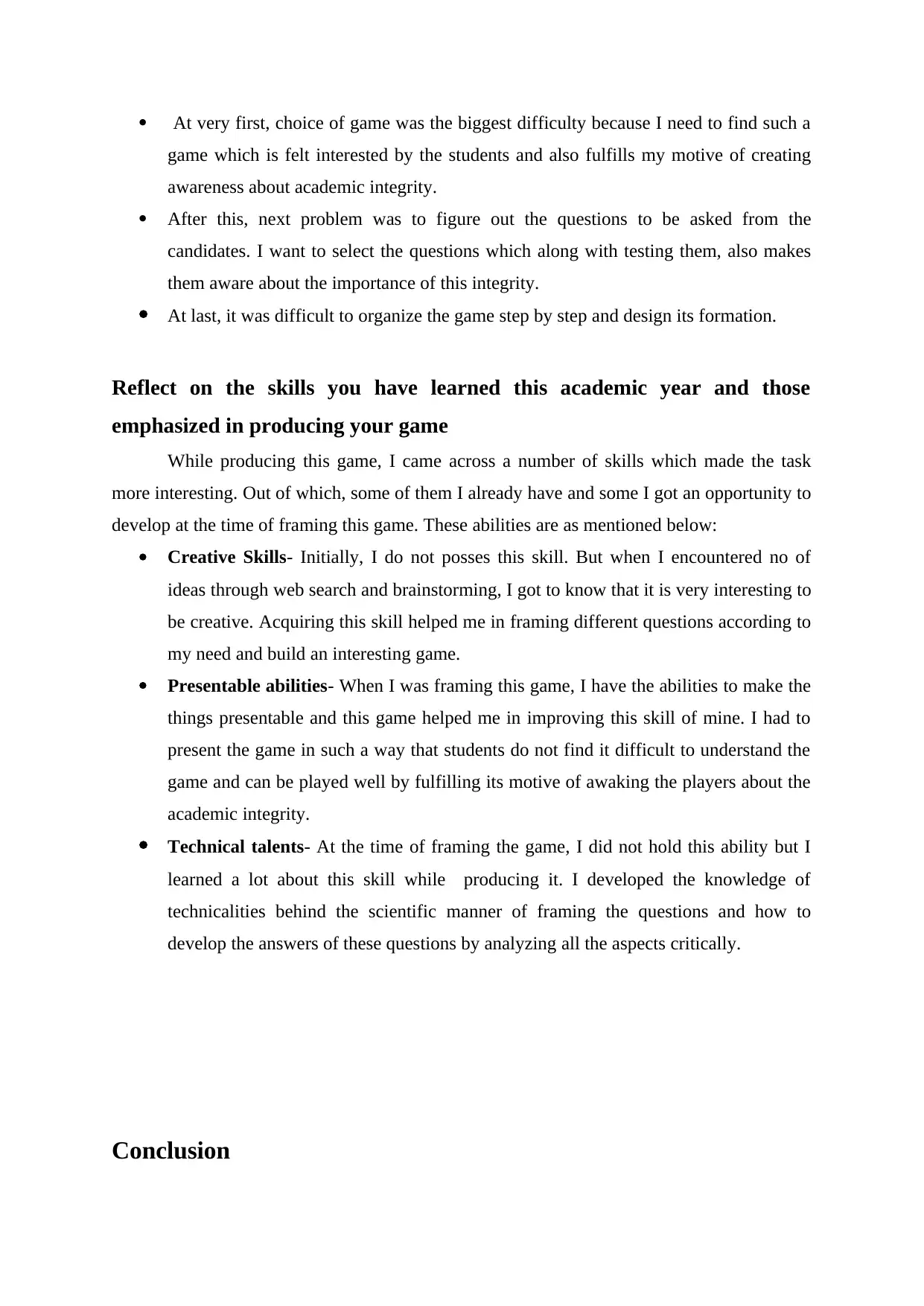
At very first, choice of game was the biggest difficulty because I need to find such a
game which is felt interested by the students and also fulfills my motive of creating
awareness about academic integrity.
After this, next problem was to figure out the questions to be asked from the
candidates. I want to select the questions which along with testing them, also makes
them aware about the importance of this integrity.
At last, it was difficult to organize the game step by step and design its formation.
Reflect on the skills you have learned this academic year and those
emphasized in producing your game
While producing this game, I came across a number of skills which made the task
more interesting. Out of which, some of them I already have and some I got an opportunity to
develop at the time of framing this game. These abilities are as mentioned below:
Creative Skills- Initially, I do not posses this skill. But when I encountered no of
ideas through web search and brainstorming, I got to know that it is very interesting to
be creative. Acquiring this skill helped me in framing different questions according to
my need and build an interesting game.
Presentable abilities- When I was framing this game, I have the abilities to make the
things presentable and this game helped me in improving this skill of mine. I had to
present the game in such a way that students do not find it difficult to understand the
game and can be played well by fulfilling its motive of awaking the players about the
academic integrity.
Technical talents- At the time of framing the game, I did not hold this ability but I
learned a lot about this skill while producing it. I developed the knowledge of
technicalities behind the scientific manner of framing the questions and how to
develop the answers of these questions by analyzing all the aspects critically.
Conclusion
game which is felt interested by the students and also fulfills my motive of creating
awareness about academic integrity.
After this, next problem was to figure out the questions to be asked from the
candidates. I want to select the questions which along with testing them, also makes
them aware about the importance of this integrity.
At last, it was difficult to organize the game step by step and design its formation.
Reflect on the skills you have learned this academic year and those
emphasized in producing your game
While producing this game, I came across a number of skills which made the task
more interesting. Out of which, some of them I already have and some I got an opportunity to
develop at the time of framing this game. These abilities are as mentioned below:
Creative Skills- Initially, I do not posses this skill. But when I encountered no of
ideas through web search and brainstorming, I got to know that it is very interesting to
be creative. Acquiring this skill helped me in framing different questions according to
my need and build an interesting game.
Presentable abilities- When I was framing this game, I have the abilities to make the
things presentable and this game helped me in improving this skill of mine. I had to
present the game in such a way that students do not find it difficult to understand the
game and can be played well by fulfilling its motive of awaking the players about the
academic integrity.
Technical talents- At the time of framing the game, I did not hold this ability but I
learned a lot about this skill while producing it. I developed the knowledge of
technicalities behind the scientific manner of framing the questions and how to
develop the answers of these questions by analyzing all the aspects critically.
Conclusion
Paraphrase This Document
Need a fresh take? Get an instant paraphrase of this document with our AI Paraphraser
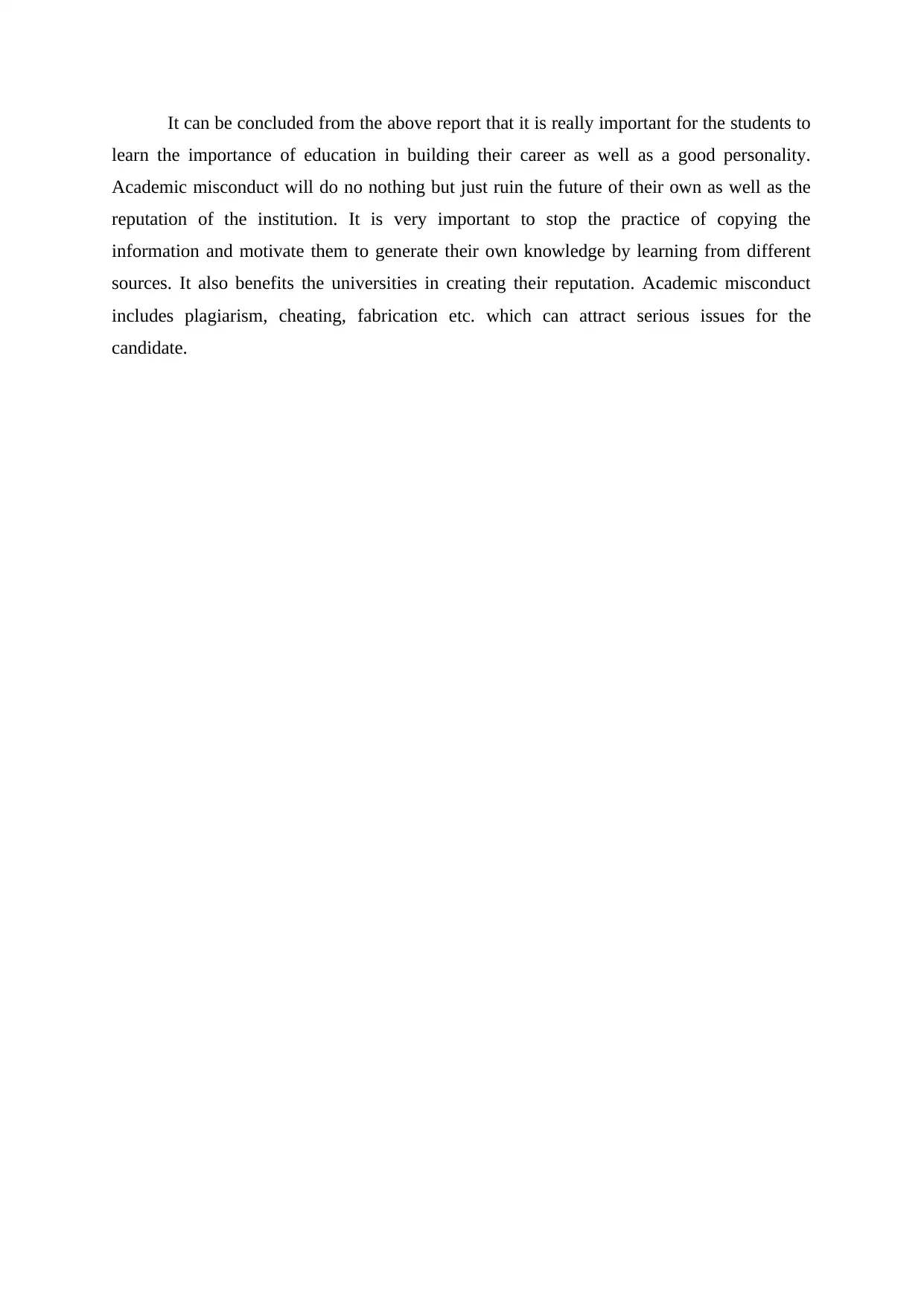
It can be concluded from the above report that it is really important for the students to
learn the importance of education in building their career as well as a good personality.
Academic misconduct will do no nothing but just ruin the future of their own as well as the
reputation of the institution. It is very important to stop the practice of copying the
information and motivate them to generate their own knowledge by learning from different
sources. It also benefits the universities in creating their reputation. Academic misconduct
includes plagiarism, cheating, fabrication etc. which can attract serious issues for the
candidate.
learn the importance of education in building their career as well as a good personality.
Academic misconduct will do no nothing but just ruin the future of their own as well as the
reputation of the institution. It is very important to stop the practice of copying the
information and motivate them to generate their own knowledge by learning from different
sources. It also benefits the universities in creating their reputation. Academic misconduct
includes plagiarism, cheating, fabrication etc. which can attract serious issues for the
candidate.
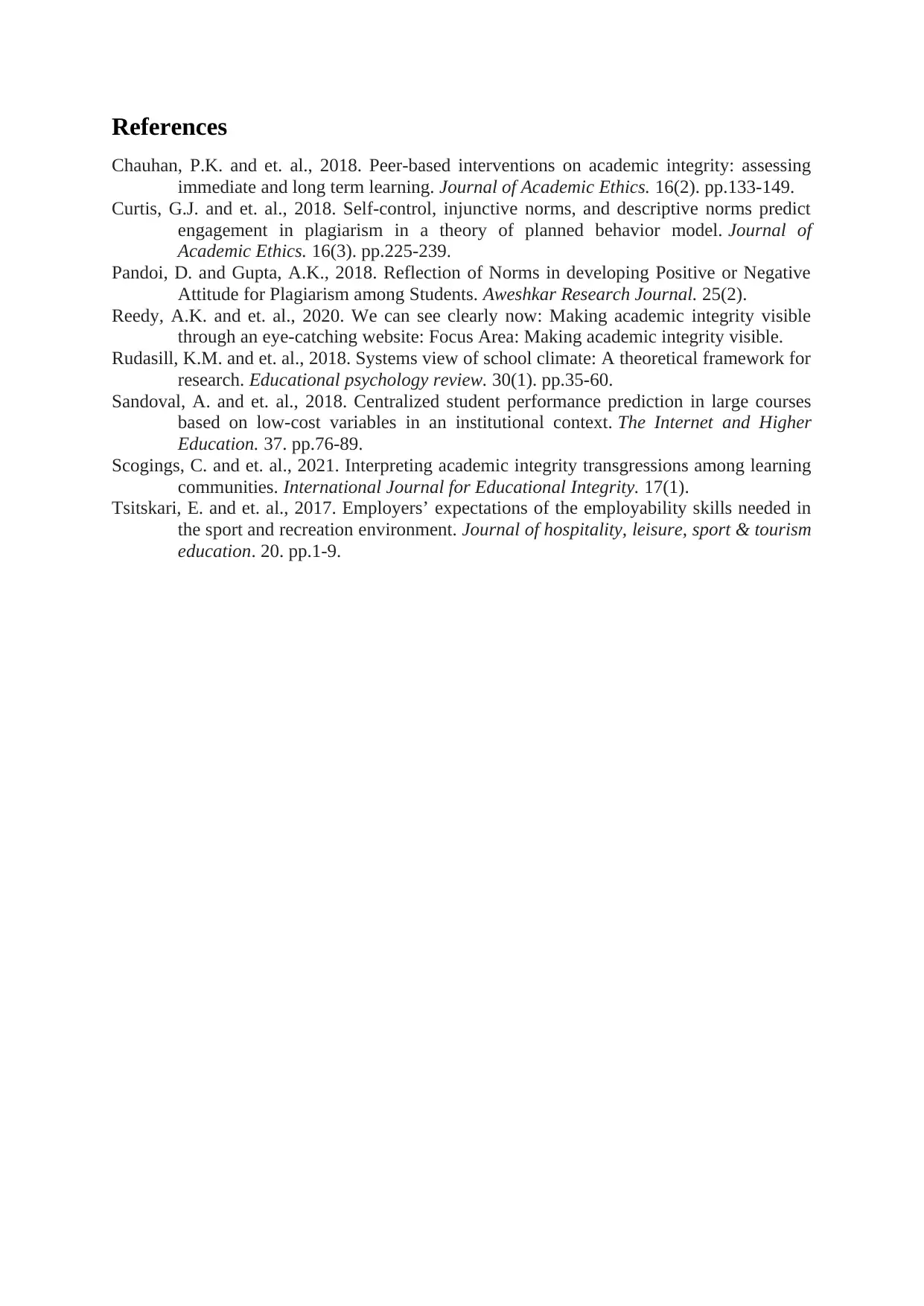
References
Chauhan, P.K. and et. al., 2018. Peer-based interventions on academic integrity: assessing
immediate and long term learning. Journal of Academic Ethics. 16(2). pp.133-149.
Curtis, G.J. and et. al., 2018. Self-control, injunctive norms, and descriptive norms predict
engagement in plagiarism in a theory of planned behavior model. Journal of
Academic Ethics. 16(3). pp.225-239.
Pandoi, D. and Gupta, A.K., 2018. Reflection of Norms in developing Positive or Negative
Attitude for Plagiarism among Students. Aweshkar Research Journal. 25(2).
Reedy, A.K. and et. al., 2020. We can see clearly now: Making academic integrity visible
through an eye-catching website: Focus Area: Making academic integrity visible.
Rudasill, K.M. and et. al., 2018. Systems view of school climate: A theoretical framework for
research. Educational psychology review. 30(1). pp.35-60.
Sandoval, A. and et. al., 2018. Centralized student performance prediction in large courses
based on low-cost variables in an institutional context. The Internet and Higher
Education. 37. pp.76-89.
Scogings, C. and et. al., 2021. Interpreting academic integrity transgressions among learning
communities. International Journal for Educational Integrity. 17(1).
Tsitskari, E. and et. al., 2017. Employers’ expectations of the employability skills needed in
the sport and recreation environment. Journal of hospitality, leisure, sport & tourism
education. 20. pp.1-9.
Chauhan, P.K. and et. al., 2018. Peer-based interventions on academic integrity: assessing
immediate and long term learning. Journal of Academic Ethics. 16(2). pp.133-149.
Curtis, G.J. and et. al., 2018. Self-control, injunctive norms, and descriptive norms predict
engagement in plagiarism in a theory of planned behavior model. Journal of
Academic Ethics. 16(3). pp.225-239.
Pandoi, D. and Gupta, A.K., 2018. Reflection of Norms in developing Positive or Negative
Attitude for Plagiarism among Students. Aweshkar Research Journal. 25(2).
Reedy, A.K. and et. al., 2020. We can see clearly now: Making academic integrity visible
through an eye-catching website: Focus Area: Making academic integrity visible.
Rudasill, K.M. and et. al., 2018. Systems view of school climate: A theoretical framework for
research. Educational psychology review. 30(1). pp.35-60.
Sandoval, A. and et. al., 2018. Centralized student performance prediction in large courses
based on low-cost variables in an institutional context. The Internet and Higher
Education. 37. pp.76-89.
Scogings, C. and et. al., 2021. Interpreting academic integrity transgressions among learning
communities. International Journal for Educational Integrity. 17(1).
Tsitskari, E. and et. al., 2017. Employers’ expectations of the employability skills needed in
the sport and recreation environment. Journal of hospitality, leisure, sport & tourism
education. 20. pp.1-9.
⊘ This is a preview!⊘
Do you want full access?
Subscribe today to unlock all pages.

Trusted by 1+ million students worldwide
1 out of 9
Related Documents
Your All-in-One AI-Powered Toolkit for Academic Success.
+13062052269
info@desklib.com
Available 24*7 on WhatsApp / Email
![[object Object]](/_next/static/media/star-bottom.7253800d.svg)
Unlock your academic potential
Copyright © 2020–2026 A2Z Services. All Rights Reserved. Developed and managed by ZUCOL.



